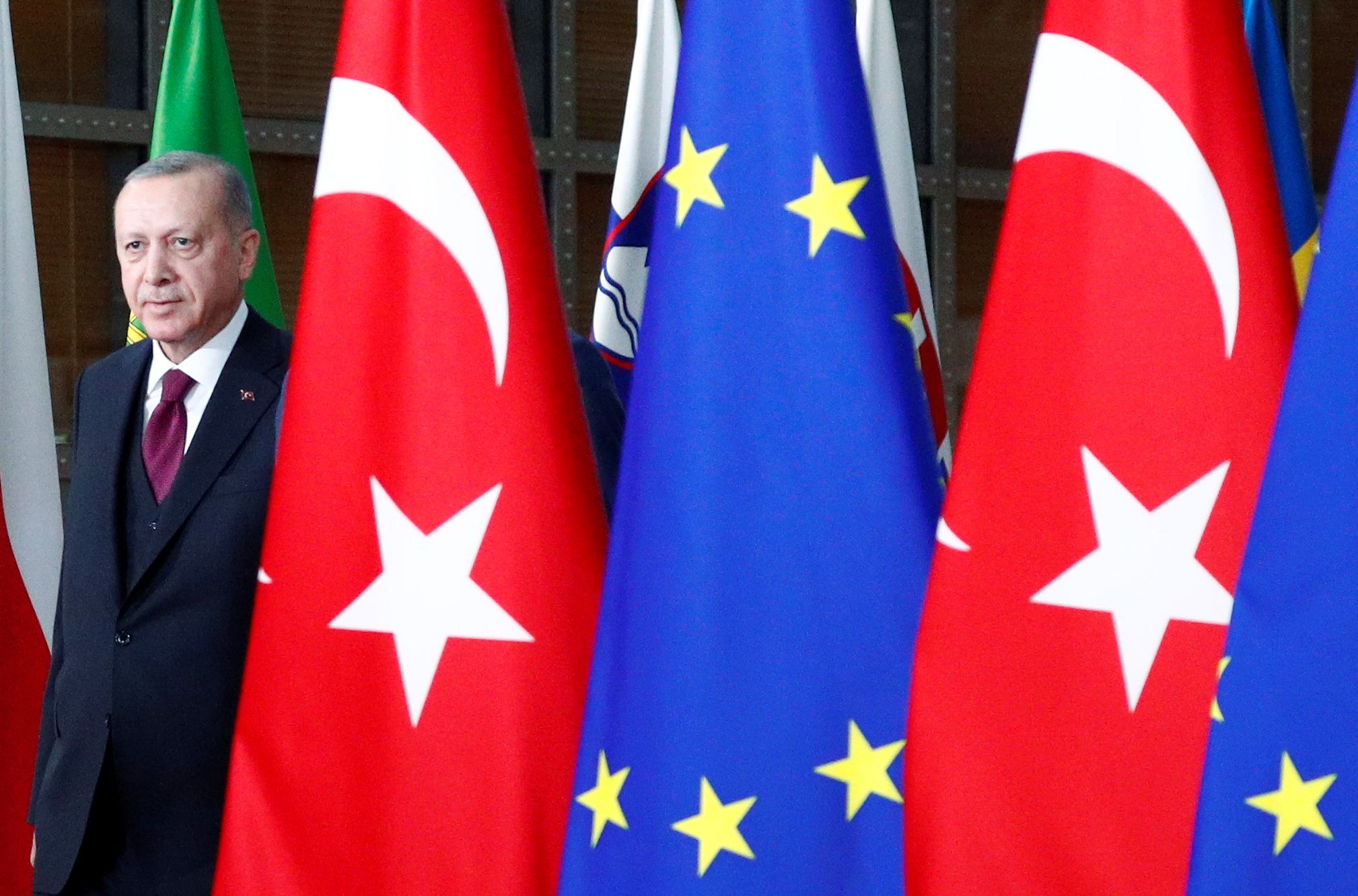Changes in the EU’s Policy Towards Turkey

On 6 July, the High Representative of the Union for Foreign Affairs and Security Policy Josep Borell travelled to Turkey to discuss problems in Turkish-European relations with Mevlüt Çavuşoğlu, the country’s foreign minister. The background of the meeting consisted of tensions in Turkish-French relations and the upcoming Foreign Affairs Council (13 July) where EU ministers were to discuss the future of relations with Turkey. The Borell-Çavuşoğlu meeting and the Council focused on the differences between the partners in the Eastern Mediterranean—especially Turkey’s violation of Greece’s borders and its exploration for resources in the Republic of Cyprus’ Exclusive Economic Zone—and Libya, and almost no mention was made of Turkey’s accession process. This is a significant change in the EU’s approach towards Turkey and may be seen as a step towards a new model of relations. This was underlined by the commitment imposed on Borrell by the Council. He was asked to prepare a proposal aimed at resuming the dialogue and reducing tensions with Turkey. At the same time, the proposal was to include options for measures to take if those aims couldn’t be reached.
The Anatomy of the Impasse
The EU and Turkey have been unable to develop a mutually beneficial model of relations that set the framework and principles for their cooperation. The partners have been grappling with this especially since 2013 when it became clear that the growing authoritarian tendencies in Turkey have made accession negotiations unrealistic. The 2015 refugee crisis created an opportunity to re-organise European-Turkish relations. To limit the effects of the crisis, in March 2016 the EU signed a migration management deal with Turkey. As part of it, the Turks pledged to stop migrants heading to Europe in exchange for financial aid, visa liberalisation, and the revival of accession negotiations. This suited the Turks, who argued that although membership in the EU remains the state’s “strategic goal”, they prefer transactional relations in which Turkey has an equal position. Yet, in reality—and contrary to the Turks’ expectations—the deal was still based on conditionality. The EU was ready to abolish visas for Turkish citizens but only after Turkey has met the necessary requirements, such as revision of its restrictive anti-terrorism law. The EU also did not intend to revive the accession negotiations if Turkey did not return to a path of reforms bringing it closer to the Copenhagen criteria (now, after the introduction of the presidential system, which breaches the principle of the division of power, it has become almost impossible). The difference in interpretation of the agreement between Turkey, which saw it as purely transactional, granting certain benefits for halting migration, and the EU has been a source of numerous controversies between the partners.
Nonetheless, the Turks recognized the deal as an expression of the EU’s dependence in migration matters. This, in turn, led them to two conclusions: that thanks to the agreement Turkey is a stronger party in the relationship, and therefore it will not suffer any meaningful consequences for taking actions that run counter to the EU’s interests. This is why in the last several years the Turks have repeatedly blackmailed their European partners, threatening to break the deal unless they gained political benefits, with opening the Turkish-Greek border to migrants in February being the most recent example. They also decided to pursue a policy in the Eastern Mediterranean that ran counter to the interests of EU members Greece and Cyprus, and in Syria, Iraq and Libya the Turks undertook military interventions criticized by the EU as unilateral. The Turkish authorities also stepped up their anti-Western rhetoric, very often directing it to the Turkish diaspora in Europe as an additional instrument of pressure on such states as Germany or the Netherlands. They also decided to put additional pressure on EU countries in matters important to Turkish national security or to the ruling camp. For example, to force Germany to extradite people who had fled Turkey after the July 2016 coup and were suspected of participating in it, they arrested German human right activists. Moreover, as indicated in reports by the German Federal Office for the Protection of the Constitution, Turkey stepped up intelligence activities in countries with a large Turkish diaspora to gather information about opponents of the government. To persuade the EU to modernise the customs union and to defend Turkey’s struggling economy, it began to violate the existing agreement, for example by introducing additional licensing criteria.
Turkey’s military operations in Syria, which led to tensions between the Turks and Kurds, have had a destabilising effect in European countries with a large Turkish diaspora. The policy in the Eastern Mediterranean created tensions within the EU between the members who demanded a more confrontational position towards Turkey (Greece, Cyprus, France) and those who insisted on dialogue (Germany). As a result, any chances of breaking the deadlock in the EU-Turkey relations were blocked as many members believed that seeking a breakthrough would mean rewarding Turkey for its confrontational policy. The situation was further complicated by the attitude of the European Parliament, which has repeatedly called on the European Commission to either suspend or formally end the accession negotiations with Turkey, including in July this year.
Conclusions and Recommendations
Shifting the centre of gravity in European-Turkish relations from the accession process to foreign policy is beneficial for the EU. It can help the Union rebuild relations with Turkey in the face of apparent failure of the accession negotiations. It will also enable it to focus on the most serious problems instead of trying to bring about changes in Turkish domestic politics (which is unrealistic as the maintenance of power by Recep Tayyip Erdoğan requires further authoritarianism). In addition, the departure from conditionality in the dimension of Turkey’s internal policy may unblock some of the EU’s instruments of influence on the country, which had remained bound by some Member States that sought to link them to democratic changes in Turkey.
Breaking the deadlock in European-Turkish relations would be possible if the EU creates a mutually attractive offer of cooperation. In addition to maintaining migration cooperation, under which the Union would increase funds to improve the situation of Syrian refugees, it could include the modernisation of the customs union by extending the existing agreement to include the services sector or public procurement and further liberalisation, for example, in the area of agriculture or non-tariff barriers—very important for the Turkish economy. A strong economic instrument for influencing Turkey would also be incentives for European companies that, because of the COVID-19 pandemic, would like to relocate production from China to Turkey.
However, it is crucial for the Union to take a firm stance towards Turkey now so that its decision-makers are aware of the costs of acting against EU interests. This means that the EU’s new approach to Turkey should be supplemented with tangible sanctions, including for actions destabilising the situation in European countries or violating their borders. It would also be beneficial for the EU to signal that it is ready to improve relations with Turkey only when it stops policies unfavourable to the Member States; for example, talks on the modernisation of the customs union should begin only after Turkey ceases to breach its previous provisions. The Union should also be aware that a sustained improvement in relations with Turkey requires a solution to the problems in the Eastern Mediterranean, including a solution to the Cyprus issue.
The EU’s firm policy towards Turkey will surely lead to increased tensions in relations and negative consequences for some Member States in the short term (for example, for Poland it will be problematic if the dispute is moved to the NATO level, as was the case in Turkey’s blocking the Alliance’s plans for the Eastern Flank). In the longer term, however, showing that Turkish actions will be met with a strong EU response, combined with a realistic offer of cooperation should induce Turkey to take a more cooperative stance.


